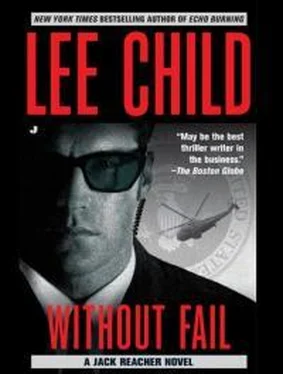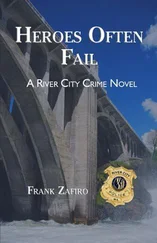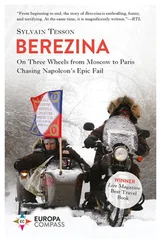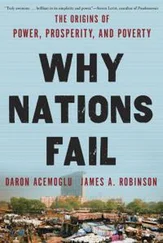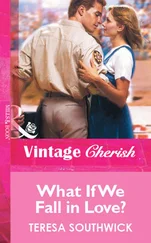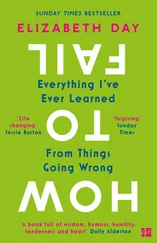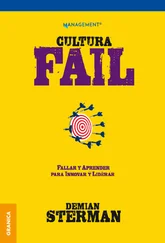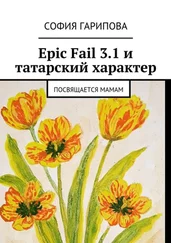Ли Чайлд - Without Fail
Здесь есть возможность читать онлайн «Ли Чайлд - Without Fail» весь текст электронной книги совершенно бесплатно (целиком полную версию без сокращений). В некоторых случаях можно слушать аудио, скачать через торрент в формате fb2 и присутствует краткое содержание. Жанр: Крутой детектив, Триллер, на английском языке. Описание произведения, (предисловие) а так же отзывы посетителей доступны на портале библиотеки ЛибКат.
- Название:Without Fail
- Автор:
- Жанр:
- Год:неизвестен
- ISBN:нет данных
- Рейтинг книги:3 / 5. Голосов: 1
-
Избранное:Добавить в избранное
- Отзывы:
-
Ваша оценка:
- 60
- 1
- 2
- 3
- 4
- 5
Without Fail: краткое содержание, описание и аннотация
Предлагаем к чтению аннотацию, описание, краткое содержание или предисловие (зависит от того, что написал сам автор книги «Without Fail»). Если вы не нашли необходимую информацию о книге — напишите в комментариях, мы постараемся отыскать её.
The secretive, closed organization that invites Jack Reacher in is the Secret Service, the organization that protects the Presidency. Someone who was once close to Reacher’s brother, needs help in her new job. Her new job? Saving the Vice President of the United States from being assassinated.
Without Fail — читать онлайн бесплатно полную книгу (весь текст) целиком
Ниже представлен текст книги, разбитый по страницам. Система сохранения места последней прочитанной страницы, позволяет с удобством читать онлайн бесплатно книгу «Without Fail», без необходимости каждый раз заново искать на чём Вы остановились. Поставьте закладку, и сможете в любой момент перейти на страницу, на которой закончили чтение.
Интервал:
Закладка:
“Got these from the lab,” he said. “Special circumstances. We don’t want to use latex. Don’t want to confuse the talcum traces.”
The gloves were clumsy. He had to slide the envelope to the edge of the table to pick it up. He held it with one hand and looked for something to open it with. Reacher took his ceramic knife out of his pocket and snapped it open. Offered it handle-first. Bannon took it and eased the tip of the blade under the corner of the flap. Moved the envelope backward and the knife forward. The blade cut the paper like it was cutting air. He handed the knife back to Reacher and pressed on the sides of the envelope so it made a mouth. Glanced inside. Turned the envelope over and tipped something out.
It was a single sheet of letter-size paper. Heavyweight white stock. It landed and skidded an inch on the polished wood and settled flat. It had a question printed over two lines, centered between the margins, a little higher than halfway up the sheet. Five words, in the familiar severe typeface: Did you like the demonstration ? The last word was the only word on the second line. That isolation gave it some kind of extra emphasis.
Bannon turned the envelope over and checked the postmark.
“Vegas again,” he said. “Saturday. They’re real confident, aren’t they? They’re asking if he liked the demonstration three days before they staged it.”
“We have to move out now,” Froelich said. “Lift-off at ten. I want Reacher and Neagley with me. They’ve been there before. They know the ground.”
Stuyvesant raised his hand. A vague gesture. Either OK or whatever or don’t bother me , Reacher couldn’t tell.
“I want twice-daily meetings,” Bannon said. “In here, seven every morning and maybe ten at night?”
“If we’re in town,” Froelich said. She headed for the door. Reacher and Neagley followed her out of the room. Reacher caught her and nudged her elbow and steered her left instead of right, down the corridor toward her office.
“Do the database search,” he whispered.
She glanced at her watch. “It’s way too slow.”
“So start it now and let it compile all day.”
“Won’t Bannon do it?”
“Probably. But double-checking never hurt anybody.”
She paused. Then she turned and headed for the interior of the floor. Lit up her office and turned on her computer. The NCIC database had a complex search protocol. She entered her password and clicked the cursor into the box and typed thumbprint .
“Be more specific,” Reacher said. “That’s going to give you ten zillion plain-vanilla fingerprint cases.”
She tabbed backward and typed thumbprint+document+ letter+signature .
“OK?” she said.
He shrugged. “I was born before these things were invented.”
“It’s a start,” Neagley said. “We can refine it later if we need to.”
So Froelich clicked on search and the hard disk chattered and the inquiry box disappeared from the screen.
“Let’s go,” she said.
Moving a threatened Vice President-elect from the District of Columbia to the great state of North Dakota was a complicated undertaking. It required eight separate Secret Service vehicles, four police cars, a total of twenty agents, and an airplane. Staging the local political rally itself required twelve agents, forty local police officers, four State Police vehicles, and two local canine units. Froelich spent a total of four hours on the radio in order to coordinate the whole operation.
She left her own Suburban in the garage and used a stretched Town Car with a driver so she could be free to concentrate on giving orders. Reacher and Neagley sat with her in the back and they drove out to Georgetown and parked near Armstrong’s house. Thirty minutes later they were joined by the gun car and two Suburbans. Fifteen minutes after that, an armored Cadillac stretch showed up and parked with its passenger door tight against the tent. Then two Metro cruisers sealed the street, top and bottom. Their light bars were flashing. All vehicles were using full headlights. The sky was dark gray and a light rain was falling. Everybody kept their engines idling to power their heaters and exhaust fumes were drifting and pooling near the curbs.
They waited. Froelich talked to the personal detail in the house and the Air Force ground crew at Andrews. She talked to the cops in their cars. She listened to traffic reports from a radio news helicopter. The city was jammed because of the weather. The Metro traffic division was recommending a long loop right around the Beltway. Andrews reported that the mechanics had signed off on the plane and the pilots were aboard. The personal detail reported that Armstrong had finished his morning coffee.
“Move him,” she said.
The transfer inside the tent was invisible, but she heard it happen in her earpiece. The limo moved away from the curb and a Suburban jumped ahead of it and formed up behind the lead cop. The gun car came next, then Froelich’s stretch, then the second Suburban, then the trail cop. The convoy moved out and straight up Wisconsin Avenue, through Bethesda, traveling directly away from Andrews. But then it turned right and swung onto the Beltway and settled in for a fast clockwise loop. By then Froelich was patched through to Bismarck and was checking the arrival arrangements. Local ETA was one o’clock and she wanted plans in place so she could sleep on the flight.
The convoy used the north gate into Andrews and swept right onto the tarmac. Armstrong’s limo stopped with its passenger door twenty feet from the bottom of the steps up to the plane. The plane was a Gulfstream twinjet painted in the Air Force’s ceremonial blue United States of America livery. Its engines were whining loudly and blowing rain across the ground in thin waves. The Suburbans spilled agents and Armstrong slid out of his limo and ran the twenty feet through the drizzle. His personal detail followed, and then Froelich and Neagley and Reacher. A waiting press van contributed two reporters. A second three-man team of agents brought up the rear. Ground crew wheeled the stairs away and a steward closed the airplane door.
Inside it was nothing like the Air Force One Reacher had seen in the movies. It was more like the kind of bus a small-time rock band would ride in, a plain little vehicle customized with twelve better-than-stock seats. Eight of them were arranged in two groups of four with tables between each facing pair, and there were four facing ahead in a row straight across the front. The seats were leather and the tables were wood, but they looked out of place in the utilitarian fuselage. There was clearly a pecking order about who sat where. People crowded the aisle until Armstrong chose his place. He went for a backward-facing window seat in the port-side foursome. The two reporters sat down opposite. Maybe they had arranged an interview to kill the downtime. Froelich and the personal detail took the other foursome. The backup agents and Neagley took the front row. Reacher was left with no choice. The one seat that remained put him directly across the aisle from Froelich, but it also put him right next to Armstrong.
He stuffed his coat into the overhead bin and slid into the seat. Armstrong glanced at him like he was already an old friend. The reporters checked him out. He could feel their inquiring gaze. They were looking at his suit. He could see them thinking: too upmarket for an agent. So who is this guy? An aide? An appointee ? He buckled his seat belt like sitting next to Vice Presidents-elect was something he did every four years, regular as clockwork. Armstrong did nothing to disabuse his audience. Just sat there, poised, waiting for the first question.
Читать дальшеИнтервал:
Закладка:
Похожие книги на «Without Fail»
Представляем Вашему вниманию похожие книги на «Without Fail» списком для выбора. Мы отобрали схожую по названию и смыслу литературу в надежде предоставить читателям больше вариантов отыскать новые, интересные, ещё непрочитанные произведения.
Обсуждение, отзывы о книге «Without Fail» и просто собственные мнения читателей. Оставьте ваши комментарии, напишите, что Вы думаете о произведении, его смысле или главных героях. Укажите что конкретно понравилось, а что нет, и почему Вы так считаете.
